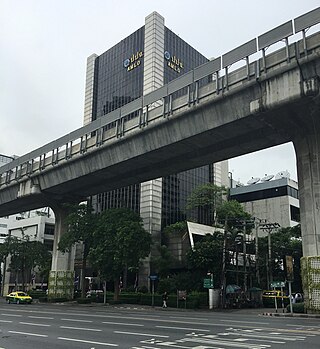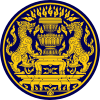Public holidays in Thailand are regulated by the government, and most are observed by both the public and private sectors. There are usually nineteen public holidays in a year, but more may be declared by the cabinet. Other observances, both official and non-official, local and international, are observed to varying degrees throughout the country.
The National Statistical Office of Thailand (NSO) is the government of Thailand's official statistics surveyor. It is an agency of the Ministry of Digital Economy and Society (MDES). One of its tasks is a nationwide census conducted every 10 years, the latest in 2010.

The Anti-Money Laundering Office (AMLO) is Thailand's "key agency responsible for enforcement of the anti-money laundering and the counter-terrorism financing law." It was founded in 1999 upon the adoption of the Anti-Money Laundering Act, B.E. 2542 (1999) (AMLA). AMLO is an independent governmental agency. It has the status of a department functioning independently and neutrally under the supervision of the minister of justice, but is not part of the justice ministry. In 2016, Prime Minister Prayut Chan-o-cha ordered by the cabinet resolution change the command to under the supervision of the Prime Minister directly.
Thailand is a unitary state in Southeast Asia. The administrative services of the executive branch of the government are regulated by the National Government Organisation Act, BE 2534 (1991). Under this Act, the services are divided into three levels: central, provincial and local.

Internal Security Operations Command or ISOC is the political arm of the Royal Thai Armed Forces. It was responsible for the suppression of leftist groups from the 1960s to the 1980s. During this period it was implicated in atrocities against activists and civilians. ISOC was implicated in a plot to assassinate Prime Minister Thaksin Shinawatra.
The Office of the National Economic and Social Development Council, also known as NESDC, is a national economic planning agency of Thailand. It is a government department reporting directly to the Office of the Prime Minister. The NESDC maintains four regional offices in Chiang Mai, Khon Kaen, Songkhla, and Nonthaburi. Sanit Aksornkoae, Chairman of the NESDC, stated that in 2018 the Office of the National Economic and Social Development Board (NESDB) underwent a major revamp, including being officially renamed the NESDC. The NESDC's Secretary-General is Thosaporn Sirisamphand, appointed 4 July 2018. Its FY2019 budget is 609.7 million baht.

The Bangkok Metropolitan Administration (BMA) is the local government of Bangkok, which includes the capital of the Kingdom of Thailand. The government is composed of two branches: the executive and the legislative. The administration's roles are to formulate and implement policies to manage Bangkok. Its purview includes transport services, urban planning, waste management, housing, roads and highways, security services, and the environment.

The Office of the Prime Minister is the central executive agency in the Government of the Kingdom of Thailand. It is classified as a cabinet department and is led by a permanent secretary. Its main responsibility is to assist the Prime Minister of Thailand in the role of head of government and chair of the Cabinet of Thailand.

The Ministry of Interior of the Kingdom of Thailand is a cabinet-level department in the Government of Thailand. The ministry has wide ranging responsibilities. It is responsible for local administration, internal security, citizenship, disaster management, road safety, land management, issuance of national identity cards, and public works. The ministry is responsible for appointing the 76 governors of the Provinces of Thailand. The Minister of Interior is the head of the ministry. He is appointed by the King of Thailand on the recommendation of the prime minister. Since 1 September 2023, the head of the ministry has been Anutin Charnvirakul. He is aided by two deputy ministers. The FY2019 budget of the ministry is 371,802 million baht.

Prayut Chan-o-cha is a former Thai politician and army officer who became the 29th prime minister of Thailand after seized power in the 2014 coup d'état and served until 2023. He was concurrently the minister of defence in his own government from 2019 to 2023. Prayut served as commander-in-chief of the Royal Thai Army from 2010 to 2014 and led the coup d'état which installed the National Council for Peace and Order (NCPO), the military junta which governed Thailand between 22 May 2014 and 10 July 2019.

The National Council for Peace and Order was the military junta that ruled Thailand between its 2014 Thai coup d'état on 22 May 2014 and 16 July 2019. On 20 May 2014, the military declared martial law nationwide in an attempt to stop the country's escalating political crisis, and to force the democratically elected government out of office. On 22 May, the military removed the Yingluck Shinawatra government and formed the NCPO to take control of the country. The junta censored the broadcasting system in Thailand, suspended most of the constitution, and detained members of the Thai cabinet. The NCPO was formally dissolved following the swearing-in of the new cabinet on 16 July 2019. Critics like former Thai ambassador Pithaya Pookaman charge that the NCPO "...is practically still very much intact. Its arbitrary power[s] ... transferred to the existing Internal Security Operations Command chaired by the prime minister."

The National Intelligence Agency (NIA) is an intelligence and security agency of Thailand. It serves as part of the Office of the Prime Minister. Its headquarters is in Paruskavan Palace, Bangkok.

Prasert na Nagara was a Thai scholar. Best known for his studies of ancient Thai inscriptions, he was formally trained in engineering and statistics, subjects which he taught as a professor at Kasetsart University. He served as vice president at the university and as Permanent Secretary of the Ministry of University Affairs. His influential work in history, archaeology and linguistics include the history of the Sukhothai Kingdom as well as the structure of the Tai language family.

The Ministry of Social Development and Human Security, is a Thai governmental body responsible for ensuring the welfare of the Thai people. As of 1 September 2023, the minister responsible is Varawut Silpa-archa.

The Office of the National Water Resources is Thailand's command centre for management of the nation's water resources. As of 2020, ONWR is led by Secretary-General Somkiat Prajamwong.

Taweesin Visanuyothin is a Thai psychiatrist. He is widely noted for performing the duties of spokesperson for the Ministry of Public Health and the Center for the COVID-19 Situation Administration (CCSA) which gives brief daily summaries of the COVID-19 situation in Thailand.

The eleventh election for the governorship of Bangkok was held on 22 May 2022. It took place 9 years after the latest election in 2013, long delayed due to the 2014 coup d'état.
The year 2022 is reckoned as year 2565 in the Buddhist Era. The year was marked by anticipated APEC meetings, the first Bangkok governor election after the 2014 coup, and raising inflation following COVID-19 pandemic in the country.
The National Soft Power Strategy Committee is a committee established in accordance with Order of the Office of the Prime Minister No. 230/2023 dated September 13, 2023, as a result of the order of Srettha Thavisin, the Prime Minister at the first cabinet meeting, to drive soft power within the country according to the 1 family 1 soft power policy, of the Pheu Thai Party. With Srettha as chairman of the board, Paetongtarn Shinawatra as Vice Chairman of the Board, and Suraphong Suebwonglee as Director and Secretary.

Natthaphon Narkphanit is a Thai politician and retired military officer. He was recognized for his work in national security management under the government of General Prayut Chan-o-cha in solving the problem of the spread of COVID-19 and dealing with political rallies in 2020–2021 Thai protests that affect security.


















